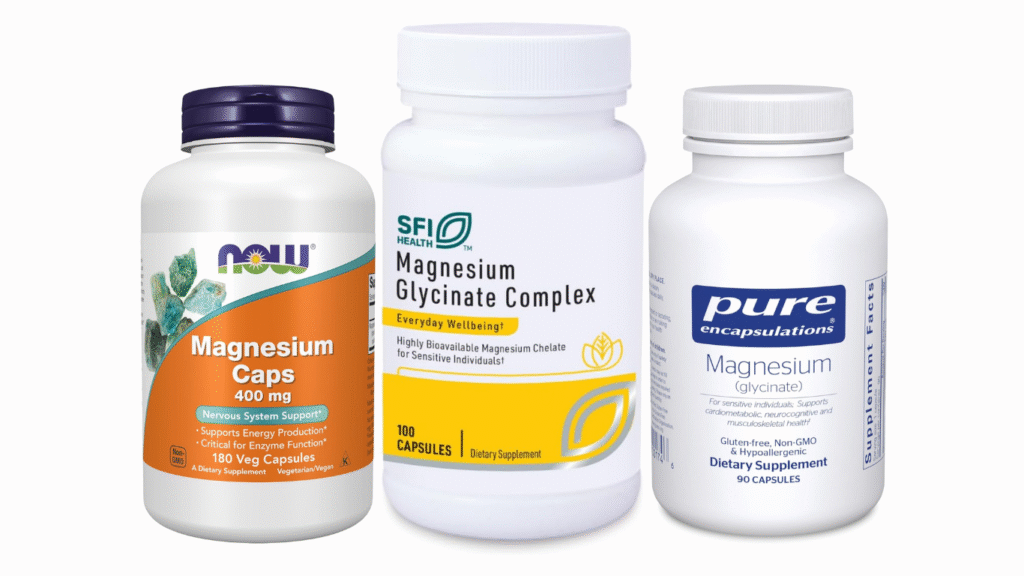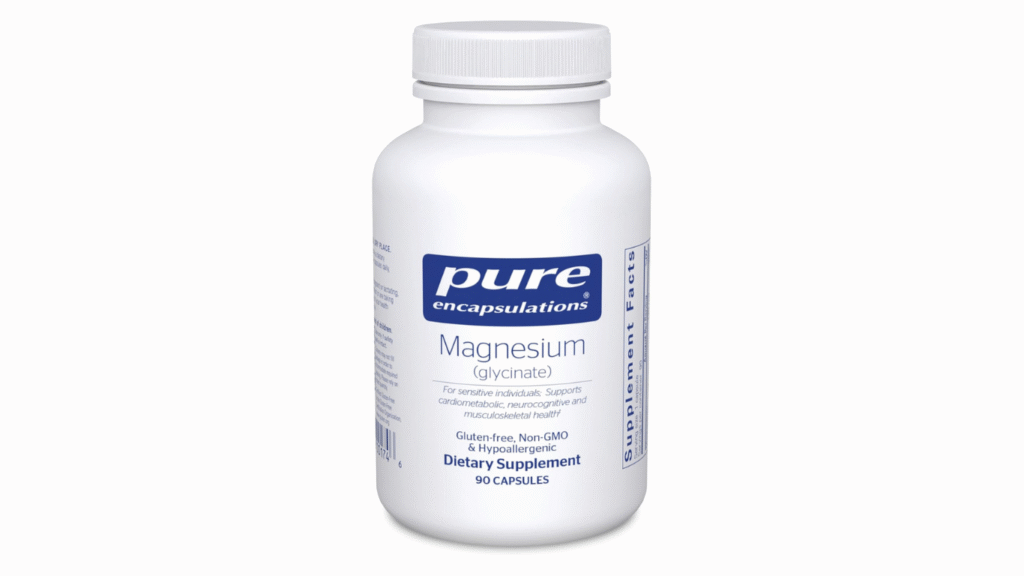Magnesium is a very important mineral in our body, it plays a vital role in muscle health, sleep and bone health. However, when choosing a magnesium supplement, the type of supplement you choose is very important.
Two common forms are magnesium glycinate and magnesium oxide. Although both provide magnesium, they differ greatly in their mechanism, absorption rate and optimal use.
In this article, we will explore the main differences, advantages and disadvantages of each to help you make the best decision for your health.
What is Magnesium and Why Do You Need It?
Magnesium is helpful for more than 300 biochemical reactions in our human body. It helps with:
- Muscle relaxation and nerve function
- Heart health and maintaining a steady heart rate
- Energy production and metabolism
- Bone strength
- Regulation of blood sugar levels
Although it is important, many people do not get enough magnesium from their diet alone. Symptoms of magnesium deficiency can include muscle cramps, fatigue, irritability, and sleep problems.
Magnesium Glycinate: A Calm and Gentle Choice
Magnesium glycinate is a blend of magnesium and glycine, an amino acid known for its soothing effects.
Benefits:
- High absorption rate: It is one of the most bioavailable forms, which means your body can easily absorb it.
- Gentle on the stomach: It is less likely to cause digestive issues like diarrhea.
- Aids in relaxation: Glycine provides a calming effect, making this form ideal for aiding sleep and reducing stress.
- Muscle and nerve support: It is beneficial for individuals experiencing muscle spasms or tension.
Best for:
- Anxiety and stress
- Insomnia or poor sleep
- Muscle cramps or spasms
- Long-term daily use
Cons:
- It is more expensive than magnesium oxide.
- It contains less magnesium content per serving.
Magnesium Oxide: High Dose, Low Absorption
Magnesium oxide, It is a type of salt that contains a higher weight percentage of magnesium as compare to other forms. However, it has low bioavailability, meaning only a small fraction of it is absorbed into the bloodstream.
Benefits:
- High magnesium content: It contains a substantial amount of magnesium.
- Effective laxative: Many people used it to relieve constipation and indigestion.
- Affordable: It is readily available and affordable.
Best for:
- Occasional constipation
- Heartburn or acid reflux
- Short-term use
Cons:
- Poor absorption (only 4%-10% is absorbed)
- May cause bloating, gas, and diarrhea
- Less effective for sleeplessness or anxiety relief.
Magnesium Glycinate vs Oxide: Side-by-Side Comparison
| Feature | Magnesium Glycinate | Magnesium Oxide |
|---|---|---|
| Absorption | High | Low |
| Digestive Tolerance | Gentle | May cause diarrhea or stomach upset |
| Elemental Magnesium | Moderate | High |
| Best Use | Sleep, anxiety, muscle relaxation | Constipation, indigestion |
| Cost | Higher | Lower |
| Daily Use | Ideal for long-term use | Not ideal for daily long-term use |
How to Choose the Right Form for You
Choose magnesium glycinate if:
- You have trouble sleeping or struggling with stress
- You want muscle relaxation without any digestive issues
- You need a mild, daily supplement that relaxes your nervous system
Choose magnesium oxide if:
- You suffer from occasional constipation
- You need a temporary boost in magnesium levels
- You’re looking for an affordable option
Each person’s body reacts differently. It’s advisable to start with a low dose and pay attention to your feelings. Also, if you have kidney problems or are taking any medications, consult your healthcare professional before starting any supplements.
Safety, Dosage & Side Effects
Dosage suggestions:
- Magnesium glycinate: 200-400 mg daily, usually divided into two doses
- Magnesium oxide: 250-500 mg daily (usually for short-term use)
Common adverse effects:
- Glycinate: Generally tolerable; side effects are rare
- Oxide: May cause loose stools, bloating, and abdominal discomfort
Safety precautions:
- Do not exceed maximum daily limit (350 mg per supplement for adults)
- Individuals with kidney problems should avoid magnesium supplements without consulting a physician
- Always follow label directions and seek guidance from a healthcare professional for individual needs
Real User Experiences
Many users have reported that magnesium glycinate promotes deep and restful sleep and reduces muscle spasms without causing digestive discomfort. Constipation sufferers often opt for magnesium oxide because of its strong laxative properties.
A summary of common responses is as follows:
- “Glycinate helps me sleep deeper and reduces my anxiety.”
- “The oxide worked immediately for my constipation, but I wouldn’t use it daily.”
- “I have used both, and glycinate is clearly better for overall health.”
Conclusion: Which One is Better?
If you’re looking for a magnesium supplement to improve overall health, sleep, or relieve anxiety, magnesium glycinate is a better choice. It’s mild, easily absorbed, and ideal for long-term use.
On the other hand, if you need immediate relief from constipation or relief from acid reflux, magnesium oxide may be the solution—just remember to use it for short periods of time.
Ultimately, the most appropriate form will depend on your specific health goals. When unsure, it’s advisable to consult a healthcare professional to determine the best option for your needs.
Also Read
FAQs: Magnesium Glycinate vs Oxide
Can I take both magnesium glycinate and oxide together?
This can be done, but is usually not needed unless a doctor recommends it. Mixing different forms may increase the chance of digestive side effects.
Which magnesium form is best for sleep?
Magnesium glycinate is often recommended to aid sleep due to its soothing properties.
Is magnesium oxide safe for daily use?
Although magnesium oxide isn’t dangerous in small amounts, long-term use can cause digestive problems, so taking it as a frequent supplement isn’t recommended.
Does magnesium glycinate cause diarrhea?
No, it is one of the mildest types and is less likely to cause diarrhea than the oxide or citrate.
What is the best time to take magnesium supplements?
Take magnesium glycinate in the Night to improve sleep. Use magnesium oxide during the day, especially if you are taking it for its laxative effect.







